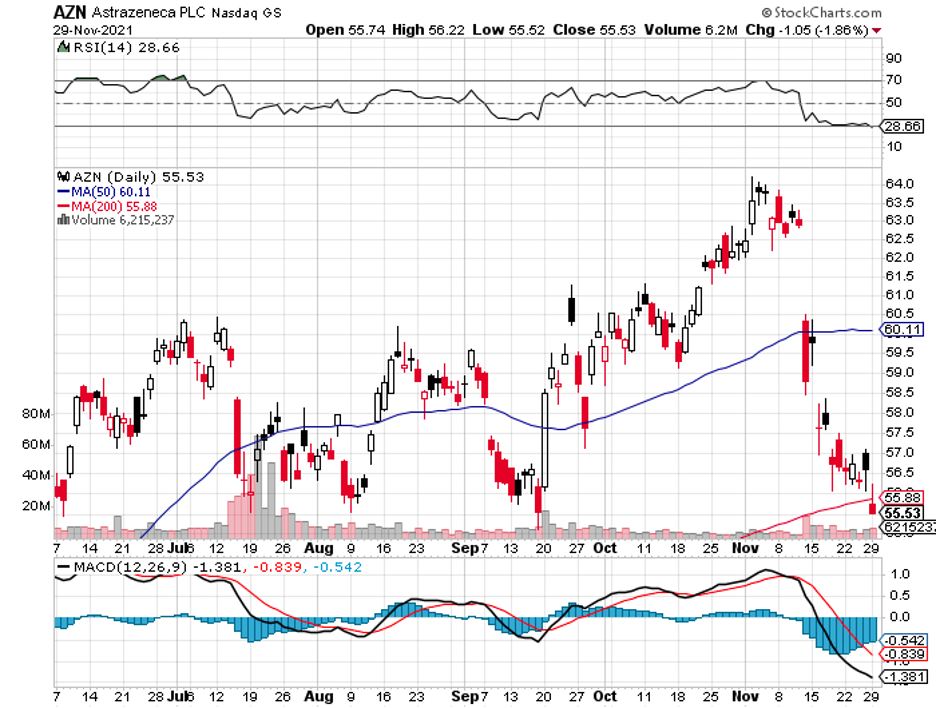Beyond the Covid-19 Vaccine
Even altruism has its limits.
Adding to the list of things we didn’t expect to happen in 2021, AstraZeneca (AZN) has followed the footsteps of Pfizer (PFE) and BioNTech (BNTX) and decided to begin making money off its COVID-19 vaccine.
The news is an about-face from the Cambridge-based company’s previous pledge to not profit from this while the pandemic is still ongoing.
Given AstraZeneca’s decision, there’s a possibility that it no longer believes that COVID-19 remains a threat of global proportions—or it at least thinks the issue has become more manageable.
It remains to be seen how the company will react to the emergence of the Omicron variant, and if it plans to push through with this decision.
While AstraZeneca’s agreements with different countries won’t allow it to come right out of the gate and just start slapping massive profits all over the place, the company plans to begin “progressively transitioning” to profitability following its third-quarter call.
Moreover, the company assured that its COVID-19 vaccine would remain reasonably priced for low- to middle-income countries. This means that it plans to jack up the price in wealthier nations instead.
However, AstraZeneca isn’t doing this for purely financial reasons.
According to the company, profits from the vaccine will be allocated to another COVID-19-related effort, its antibody therapy called AZD7442—a treatment that’s expected to compete with therapies from Regeneron (REGN) and Gilead Sciences (GILD).
Regardless of how they spin this recent turn of events, the key takeaway is that they’ll start making money off the vaccine.
Although changing their tune about the COVID-19 vaccine might get them some flak, it’s crucial to bear in mind that AstraZeneca is a for-profit company. This is the natural course for them to take vis-a-vis their products.
Besides its work on COVID-19, AstraZeneca has been pouring money on R&D over the past 12 months to fund different clinical trials for its oncology, cardiovascular, and immunology segments. To date, the company’s spending on research and development has climbed by 27.5% year-over-year to reach $3.54 billion in the first 6 months of 2021.
This move to invest heavily in developing new drugs for severe medical conditions is anticipated to secure a solid future revenue and continuous growth in earnings per share for the company.
Given its pipeline and history, AstraZeneca is actually projected to grow by over 20% annually over the course of the next five years.
One result of this effort is the expansion of the company’s top-selling cancer drug, Imfinzi.
At the moment, Imfinzi is approved as a lung cancer treatment. However, it can soon boost its sales to include biliary tract cancer in its indications.
There are roughly 50,000 individuals diagnosed with biliary tract cancer annually in the United States, Japan, and Europe, with the number hitting 210,000 across the globe.
In terms of profitability, we can look at Incyte’s (INCY) Pemazyre, which was approved in 2020. Sales of the drug grew four-fold in the first 9 months to reach $48 million.
Admittedly, Imfinzi’s market share will rely on its efficacy and safety results.
However, the treatment has a track record of delivering a superior standard of care and guaranteeing that it has the same safety profile as chemotherapy.
Hence, it’s reasonable to say that we can conservatively expect Imfinzi to capture at least 15% of the whole biliary tract cancer market. This would be roughly 30,000 patients worldwide.
Currently, Imfinzi’s price tag is at $180,000 in the US, but the drug might be cheaper in other countries.
Based on the market potential of its biliary tract cancer indication, this additional indication could rake in an additional $600 million annually for AstraZeneca once it gains regulatory approval.
Although this is merely less than 2% of the projected $36.1 billion total revenue for AstraZeneca in 2021, adding $600 million would still be a notable tailwind to the $2.5 billion estimated earnings from Imfinzi.
While its COVID-19 vaccine did not deliver the same outstanding efficacy results as the mRNA vaccines of Moderna (MRNA) and Pfizer / BioNTech, it’s still one of the handfuls of major pharmaceutical companies that managed to develop and distribute an effective product.
Overall, vaccine decisions aside, AstraZeneca appears to be in a great place with a robust oncology portfolio. Therefore, this stock looks like a solid buy with several upcoming price catalysts in 2021 and 2022.



